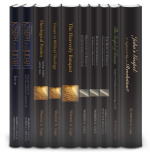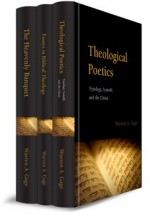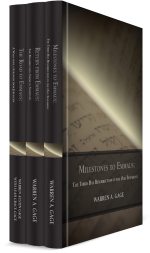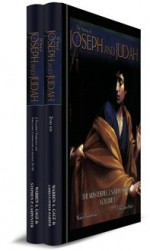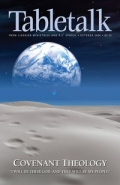Literary Biblical Theology Collection — (11 Volumes)
Overview
Professor and pastor Warren A. Gage is passionate about teaching and training students to preach and teach biblical theology. This ten-volume collection expresses that passion, examining such theological topics as the relationship between eschatology and protology, providing insight on resurrection theology, and presenting new methods for biblical interpretation and inductive Bible study. Other studies include the Joseph and Judah narrative in Genesis 37–50 and the intertextuality between the Gospel of John and Revelation.
Key Features
- Shows how to read the Hebrew Bible to see Jesus
- Approaches biblical theology based upon rhetorical and literary analysis
- Teaches to interpret the Scriptures with an awareness of form and a sense of symbol
- Demonstrates the Old Testament clearly and pervasively taught the resurrection of Christ
- Teaches an enhanced inductive Bible study method using Joseph narrative – Genesis 37-50
- Explores the Hebrew Bible to see why Jesus taught that the “THIRD DAY” was to be the eschatological day of Christ’s triumph over death
- Develops a theology of Biblical Typology: An Example,
Why is Jesus’ Hebrew name “Joshua”? Do this name and the battle of Jericho story provide clues to the dramatic narrative of John’s Revelation? In both accounts we have a whore and her scarlet, two witnesses, seven trumpets of war and a great city that falls. Is Revelation a retelling of Joshua’s battle at Jericho? Is Jesus a new Joshua? What city is the “great city”? Who then is the Whore of Babylon?
- Examines the intertextual relationship between the books of Joshua and Revelation
- Analyzes the typology of Holy war and explains the prominence of Rahab in the New Testament
Individual Titles
- Theological Poetics: Typology, Symbol, and the Christ
- Essays in Biblical Theology
- The Heavenly Banquet
- Milestones to Emmaus: The Third Day Resurrection in Scripture
- Return from Emmaus: The Resurrection Theme in Scripture
- The Road to Emmaus: A Walk with a Stranger from Jerusalem
- John’s Gospel: A Neglected Key to Revelation?
- The Gospel of Genesis: Studies in Protology and Eschatology
- Gospel Typology in Joshua and Revelation: A Whore and Her Scarlet, Seven Trumpets Sound, A Great City Falls
- The Story of Joseph and Judah: A Teacher’s Guide
- The Story of Joseph and Judah Workbook: Literary, Narrative and Structural Commentary on Genesis 37–50
Product Details
- Title: Warren A. Gage Biblical Theology Collection
- Volumes: 11
- Pages: 1,460
About the Authors
Warren A. Gage received his BA from Southern Methodist University, ThM from Dallas Theological Seminary, JD from Southern Methodist University School of Law, and MA and PhD from the University of Dallas. He is a professor of Old Testament at Knox Theological Seminary, an assistant minister at Coral Ridge Presbyterian Church, and a member of the Evangelical Theological Society.
Leah Grace Gage is a graduate student in biblical studies at Harvard. She is a summa cum laude graduate of Dartmouth College.
Christopher Barber is a graduate of Knox Theological Seminary. He currently serves as a lawyer in Fort Lauderdale, FL.
Steven P. Carpenter is a visiting lecturer of biblical theology at Knox Theological Seminary.
Praises for the Authors
Dr. Warren A. Gage takes his readers by the heart to lead them into the wonderful world of typological exegesis. This particular field of theological study makes many demands upon the expositor, including: 1) a firm embrace of orthodox theology, 2) a comprehensive grasp of Scripture in both its broad strokes and in its fine verbal details of its original languages, 3) a lively imagination to see similarities in difference and verbal concordance, 4) and a prayerful, meditative spirit upon the Scripture. I know of no expositor that excels Professor Gage in these qualities. I thank God for the marvelous gifts he has given to enrich his church through my colleague at Knox Seminary. His books are full of heart-warming reflections about Christ’s sufferings and glory that bind together God’s cosmic program of salvation.
— Bruce K. Waltke, distinguished professor of Old Testament, Knox Theological Seminary, Fort Lauderdale, FL For years,
Warren Gage has refined a style of theological exegesis that is as deep as it is luminous. He skillfully combines keen literary analysis and spiritual discernment, along with a thorough understanding of God’s inspired Word and the great Christian tradition. Building on the interpretive approach and best insights of the early church fathers, Dr. Gage uses typology to lead his readers into the heart of sacred Scripture. What a great gift his works are for our time!
— Scott W. Hahn, professor of theology and Scripture, Franciscan University of Steubenville
‘All theology is poetry,’ writes Warren Gage. Theologians will be more than surprised to hear it, because for many theology is not poetry but scientific exegesis and system-building. Gage vigorously challenges the Protestant prejudice against poetry, and shows convincingly why ‘theological poetics’ is the ‘precondition to biblical theology.’ Fortunately, Gage is more interested in practice than theory, and he demonstrates in detail what it looks like when a convinced evangelical reads the Bible as typology and symbol. The result is an intellectually invigorating, spiritually refreshing, thoroughly Christ-centered introduction to biblical theology that should be read by everyone who longs to know and love the Great Poet who is the object of all theology.
— Peter J. Leithart, senior fellow of theology and literature, New Saint Andrews College
The Story of Joseph and Judah is a fresh and biblically-sound examination of this passage of Scripture. I enjoyed it tremendously and am glad to recommend it. . . . If you are interested in a guide for personal or group Bible study, you likely won’t do much better than this.
— Tim Challies, pastor, Grace Fellowship Church, Toronto, Ontario
. . . this study helps the student of this wonderful account understand the structure of the Joseph narrative and its key themes, and how these apply to today. Undergirding their study is a rich sense of the typological framework of the Scriptures and the intertextual linkages of the Bible that are so key to its understanding.
— Michael A. G. Haykin, professor of church history and biblical spirituality, The Southern Baptist Theological Seminary
As the pastor of our church, I am always looking for quality, well written and researched materials to use in Bible study groups. I had the privilege of using The Story of Joseph and Judah in one of my men’s groups. . . . The materials were engaging and artfully presented. Our men looked forward to our study time each week and all came away with a clear understanding of the text. The flow of the chapters lent itself to men who are adept at preparing for each meeting as well as those who took a more relaxed attitude.
— Russell Silverglate, pastor, Hammock Street Church, Boca Raton, FL
